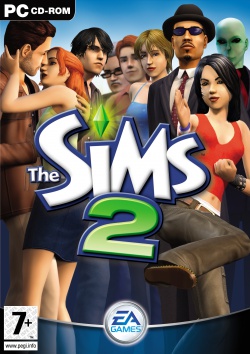GameSpy Interviews Will Wright
"During development and testing, what kinds of things did your sims do that surprised you?"
Will Wright on The Sims 2
By Dave Kosak
The venerable Will Wright talks up his next game, giving us all the dirty details.
GameSpy: Everyone probably has a different answer to this question, but what do you think made the original The Sims such a huge success, even for people who normally didn't play PC games?
Will Wright: I think the combination of an approachable subject (everyday life) and a well-tested game interface (tested for the last year of development with very casual players) were prerequisites to success.
On top of that, the open-ended narrative, rich gameplay, and the huge fan involvement (custom content, storytelling, etc.) really put it over the top.
GameSpy: The original game pulled in a very diverse audience: a huge demographic of gamers, non-gamers, men, women, and children. Did you find that they all enjoyed the game for the same reasons, or did they all get something different out of it? And, if they all got something different, was that a challenge as you began designing The Sims 2?
Will Wright: One design goal with an emergent game like the Sims is to allow different players to use the "toy" in different ways. Exploring the failure states, telling stories, re-creating your own family, and pursuing the in-game goals were all different ways that we saw people play the game. For The Sims 2 we wanted to support all of these (plus some new ones).
GameSpy: You once mentioned that the plethora of expansion packs for the original Sims game helped your team determine the feature set for The Sims 2. What, specifically, did you learn from the expansions?
Will Wright: When you're dealing with contemporary (virtual) life there are almost no limits to what you could put in the game, the trick is to find the things that actually make the game more fun. Some of the things we discovered that players really enjoyed from the expansions include:
* Indirect agent control (townies in Hot Date / pets in Unleashed)
* Embedded mini-games (souvenirs in Vacation, magic in Makin' Magic)
* New locations to visit (most expansions)
GameSpy: Okay, The Sims is on store shelves, and you're staring at a blank piece of paper (or a blank whiteboard). It was time to design the sequel! What did you set out to do from the outset?
Will Wright:
* Make sure we didn't lose the "magic" that made the original game
* Have a million meetings discussing and trying to agree on what the magic was for the original game
* Give up trying to figure out what the magic was and just go make another great game
GameSpy: The Sims 2 has a full-on 3D engine, allowing players to rotate the camera and zoom all the way in to get personal with their sims. Given the casual audience that enjoys the games -- including many who never played a 3D game in their life -- did you find that they adjusted to all this extra control quickly, or did you have to keep playing around with the interface? What kind of response have you seen from testers to the new engine?
Will Wright: The move to a 3D camera was probably the single riskiest aspect of The Sims 2. We've tried to design it as a smooth transition from the isometric camera of the original (similar controls and interface), and if you don't touch the mouse-wheel it pretty much is the same. Once you get comfortable with zooming-in you begin to feel like you're actually in the room with your sims rather than viewing them from above. This immersion really increases the emotional connection of the player, I think.
GameSpy: The original The Sims was about meeting basic needs: keeping your family fed, happy, clean, and productive. With Sims 2 you push that to the background (sims basically take care of themselves) in order to focus on bigger goals -- like romance, career, children, etc. Adding "needs" and "wants" was a pretty radical shift in design -- was it hard to balance?
Will Wright: In some ways the needs/wants design is a bit easier than the core motives because they're driven more by content (static trigger/goal conditions) and less by algorithm. But since they're easier we were able to add hundreds of them (as opposed to just eight motives), which, of course, then makes them hard again.
GameSpy: Given the success of The Sims, were you ever worried that you were "fixing what ain't broke" as you changed the design?
Will Wright: That's a constant concern on any sequel. You have to fight this line of reasoning; if you worry about it too deeply you become creatively paralyzed and won't have the flexibility to move the game to where it really needs to go.
GameSpy: One of the appeals of The Sims is that it creates a story as you go along, following the life of a sim or a family. The second game really seems to play this up: towns have their own stories, families have their own background as you start the game, and players can write their own family history to save along with a photograph of families they create. Were you intentionally trying to build up the story aspect of the game, or did it just naturally grow out of the gameplay?
Will Wright: Ever since we first started testing the first version of The Sims we noticed that people couldn't play without attaching a story to what they were seeing. This seems to be a natural way in which humans understand, remember, and communicate experiences. Over time we've come to recognize that storytelling is integral to the entire Sims idea and we're always looking for ways to let players create, drive, and share these stories.
GameSpy: From an outside observer, it looks like you've had the luxury of a much larger team for the sequel than you had for the original game. What did you do with all that extra talent?
Will Wright: Yes, The Sims 2 is about five times larger than The Sims team. Hopefully, we've managed to make the possibility space of The Sims 2 (all the things you can create and that can happen) much larger as a result.
GameSpy: The sims in The Sims 2 are a whole lot deeper than their counterparts from the original game. Aside from needs and wants, they have memories, fears, etc. What kinds of things can players expect as they interact?
Will Wright: You will notice that they have much more awareness, not just of their momentary situation, but also of relationships and time. If you give your sim a traumatic childhood they will grow with phobias and could become socially dysfunctional. The psychological failure side of the game has been vastly expanded.
GameSpy: During development and testing, what kinds of things did your sims do that surprised you?
Will Wright: They generally made me feel really sorry for them (it was all in the name of science) as I was experimenting on them. That I would "feel" for them at all (knowing how they work and all) really surprised me.
GameSpy: We understand it took a lot of tweaking to get the balance of the original game just right, to the point where it was fun and not just a game about doing dishes and using the toilet. For the last few months you've been in the home stretch of development on the sequel. What kinds of things did you struggle with as you put the final polish on The Sims 2?
Will Wright: Getting the needs/wants/fears balanced as well as tweaking the camera controls and squashing bugs.
GameSpy: People are dying to get their hands on this. Before we let you go, can you relate some of your favorite experiences as you played the game?
Will Wright: I love the new build mode, I think it's probably the best home-design software on the market from a usability / graphic rendering point of view. I've really enjoyed exploring the failure side of the new behavioral engine. Also the new create-a-sim is awesome.
Thanks again for your time. We're looking forward to the final game!













